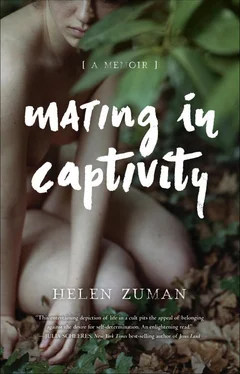Soon we, too, were sleeping together, in my bed, with Eile’s blessing. She spent most nights in her lover’s bunk in the Addition—just one flight up from Arol’s kitchen.
Prying lath from studs that had once held shelves for a square couple’s dishware, I heard a break in the squawk of nails, the croak of planks, next door, where the rest of my crew was removing the living room floor. Through slits between lath strips, I spied a half-dozen Zendik men, crowbars stilled on booted toes, in a ring around Dylan.
I paused to listen.
“So you got us pegged, huh? You’re here, what, a week, and you’re gonna give us input? Man, this ain’t no rainbow-hippie tree-sit. It’s a whole new way to live. You’re an apprentice here, not an expert. I don’t care where you’ve been.”
“I was just saying that I thought maybe—”
“Go ahead, fight the power. Get arrested. But don’t expect a medal. We know that whole scene is bull shit.”
“That’s not what—”
“Look, you gotta give it up. You gotta trust us. We’re not gonna rip you off. Just relax. Let us in. We’re your friends.”
Dylan’s shoulders slumped under his patchwork coat. He opened his mouth, then closed it. He dropped his gaze to the splintered subfloor. The ring dissolved; voices fused with the thud of crowbars.
I felt for Dylan; I knew the sting of demolition. Yet the men’s attack struck me as an act of love. They’d torn him down so he could re-form, like the boards we’d haul back to the Farm, into part of something larger. And they’d sanctioned my interest in him by “giving him energy.”
But no amount of pounding could beat back my mounting anxiety over being with an outsider. I could feel others searching us for signs of squareness, amassing damning evidence. Any day, any minute, we would be charged.
I could wait and sweat—or turn us in and find us guilty.
I ran my verdict by the girls first. With their help, I marshaled my “I” statements—the same clichés I’d used to dump Amory. After lunch, one day past the demo, I called Dylan over to join the girls and me in a ring of chairs we’d prepared in the dining hall. He sat opposite me, in the last empty seat.
I told him it was over.
His eyes sparked. “That’s fine, if you want to break up. I can respect that. But”—he gestured at the rest of the ring—“is this really your decision?”
“Yes,” I said.
He yanked the band from his head, letting his curls drop to shield his eyes. With the band crushed in his fist, he shoved his chair from the ring and stalked outside.
That evening, chopping carrots for the dinner salad at a butcher block in the main kitchen, I glimpsed a misplaced flicker.
Riven had ducked into the walk-in for an onion. Eile was blending tomatillos for green sauce at one end of the long counter along the back wall. Rayel, stationed at the other end, was spooning sour cream into a serving bowl. Between them lay eight pans of enchiladas, topped with grated cheese, waiting to bake in our mammoth range. The flicker lurked beneath the pans, hidden from Rayel and Eile.
Riven emerged from the walk-in and caught it.
“Rayel! Eile! Fire!”
Rayel and Eile jumped back from the counter. Tomatillo pulp blurped out of Eile’s blender. Rayel’s spoon hit the flagstone floor.
A tongue of flame shot past the enchiladas.
Rayel gasped. I shrieked. Eile scrambled down the steps to the sinks and out the side door. Rayel and Riven dashed out the back. The flame exploded into a sheet of raging orange, leaping to meet the cathedral ceiling and drowning the sound of voices in its roar. A thick smoke pillow filled the kitchen. Crouched to stay under it, I ran for the pantry.
In the chill air, in the clear dark, I once again heard voices.
“Extinguishers! Get the rest!”
“Where?”
“Check the Potato Shed!”
“Already checked!”
“Get the long hose from the garden!”
“It’s right here!”
“More buckets!”
“I’ll get ’em!”
“Pots! Fill pots!”
“No! Don’t go in the kitchen!”
Chances to help lit up and winked out. I hovered, inert, knowing Zendiks didn’t idle in crisis yet daring, since night hid me, to dodge the chaos.
Ladders clattered into position against the back wall of the kitchen. Boots thudded past me. Goose bumps roughened my skin.
“Kitchen’s clear! Do a chain from the sinks!”
A chain. I can do a chain.
I stepped inside.
Soot blackened every surface in the kitchen and grayed the dining-hall ceiling and walls. Dinner was charcoal. I grabbed a soup pot from under one of the butcher blocks and descended to the dish pit.
In less than fifteen minutes, the fire had been all but extinguished, and the building saved from structural harm. Only a swath of siding, just under the roof, still burned. I filled pots as a couple guys on extension ladders doused the last of the flames, at the top of the chain. Cool gusts rushed in through the back door like group sighs of relief.
Yet my relief was incomplete.
Filling pots, I glimpsed Dylan at the next sink. Guilt stiffened my shoulders and closed my throat. He—the lingering charge between us—must have triggered my paralysis.
What kind of warrior was I? What kind of weapon? I’d let some dumb crush stun me, with a battle on.
Would Arol intuit my failure? Pass it over? What would she reveal had caused the fire?
The last flame snuffed, all of us thrust into her kitchen in a seething, red-cheeked swarm, crowding the doorways and packing the floor. More than forty Zendiks thronged a room meant for five or ten.
Arol, seated with her back against the table, commanded a pocket of calm. She sipped chamomile tea as we squeezed into a breathless equilibrium. Setting her mug down, she addressed my burning question.
“I’m trying to figure this fire out, what it means psychically. And what’s coming to me is that the world doesn’t want us to have nice things. To them, our kitchen–dining hall is a threat. It’s too glamorous. It shows we’re not just a bunch of hippies shitting in the woods.”
Few outsiders would have called our kitchen–dining hall “glamorous.” It was neither sleek nor shiny. It didn’t stink of money. Instead, it testified to thousands of hours of labor: by hand, we’d laid the foundation, raised walls of mortar and cordwood, leveled a flagstone mosaic on a shifting bed of sand.
“And we’re not sure we deserve nice things either. We’re afraid to take our place as a successful, aesthetically advanced artistic movement. So the fire was a test. And you guys passed it. It was incredible how everybody pulled together.”
That can’t be it , I thought.
She hadn’t mentioned sex.
In every other tale she’d told of flames, sex was to blame.
For example: Years earlier, a candle had tipped onto her pillow and torched a house, one night when she was set to get together with someone else and Wulf was jealous. Had they faced this tension and joined to fight it, her pillow would not have ignited.
Forty-eight hours later, shredding lettuce for dinner in the Farmhouse kitchen, I spotted Arol by the living room doorway, giving an order to one of the men: “Get everybody in here. Now. ”
Fear reared in my throat, plunged through my gut, pooled in my bladder. Just as it had before my father’s spankings. Just as it had when the man in the dark coat, deep underground, had advanced to attack me.
Ten minutes later, to a packed living room, Arol delivered the verdict I’d been waiting for.
“The fire,” she hissed, skin taut across her cheekbones, “has nothing to do with the world. It’s about all of you and your stupid, square relationships. All sleeping together—everybody in a couple—and I didn’t even know . Swan had to tell me. How dare you?”
Читать дальше











